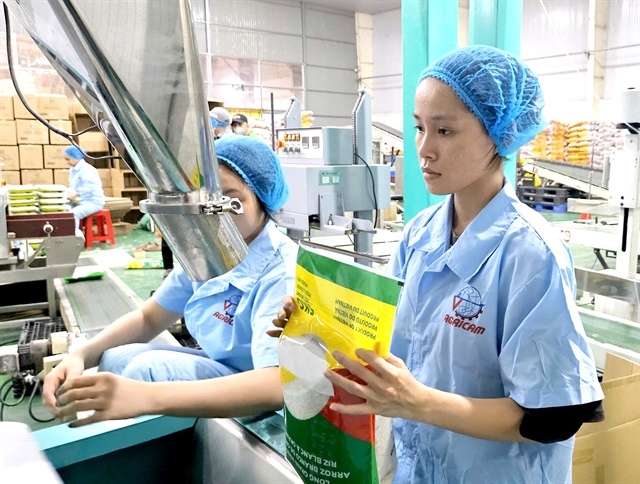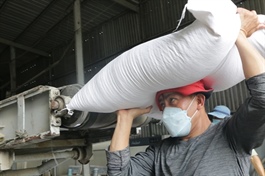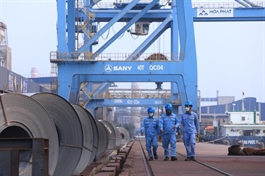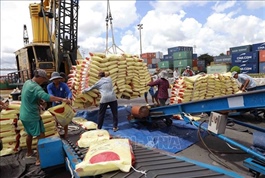Rice sector stocks struggle with short-term challenges
Rice sector stocks struggle with short-term challenges
Recent disruptions in rice imports from the Philippines and Indonesia have created immediate hurdles for Vietnamese exporters, which could dampen the outlook for rice sector stocks in the coming months.

Workers packing rice for export at a plant in Cần Thơ City. — VNS Photo Ly Ly Cao |
The domestic rice industry, a crucial component of the nation’s economy, is currently facing a mix of short-term challenges and long-term opportunities.
Recent disruptions in rice imports from the Philippines and Indonesia have created immediate hurdles for Vietnamese exporters, which could dampen the outlook for rice sector stocks in the coming months.
According to the Ministry of Agriculture and Environment (MAE), the Philippines accounts for 42.4 per cent of Việt Nam’s rice export market in the first eight months of 2025, making it a key destination for Vietnamese rice.
The temporary halt of rice imports by the Philippines has raised concerns among exporters, reflecting the industry's narrow profit margins and vulnerability to market fluctuations.
Despite these challenges, domestic companies are demonstrating resilience and adaptability.
In response to the changing landscape, the Government has taken steps to bolster production and stabilise the market.
Prime Minister Phạm Minh Chính issued a directive emphasising the need for enhanced strategies to support rice production and exports. The Ministry of Industry and Trade (MoIT) also convened a meeting with major stakeholders to devise effective responses to these challenges.
Notably, firms like Vinafood 2 and other exporters are shifting their focus toward African markets, where countries like Ghana and Côte d'Ivoire are increasing their share of imports.
The rice export market to Ghana surged by 44.4 per cent, while imports to Côte d'Ivoire skyrocketed by 88.9 per cent, according to MAE.
Rice prices exporting to these market are ranging from US$485 to $490 per tonne, which helps maintain farmer income and stabilise supply chains.
Meanwhile, Vinafood 1 is proactively acquiring and storing rice to balance its supply chain and strengthen its relationships with customers in the Philippines.
Bùi Thanh Tâm, chairwoman of Vinafood 1, said that the Philippines' temporary suspension of rice imports is a short-term measure, emphasising the importance for businesses to be ready to capitalise on opportunities when this market reopens later in the year.
According to Trần Xuân Hà, vice chairman of the Vietnam Food Association, the Philippines is expected to resume rice imports by late October or in November, December.
Additionally, the Ministry of Finance (MoF) is implementing a plan to purchase 280,000 tonnes of rice for national reserves to stabilise domestic prices.
Less appealing stocks
However, despite being a strategic sector, rice stocks on the stock market have seen a lack of investor interest.
Companies such as Trung An Hi-Tech Agriculture JSC (TAR) and Loc Troi Group (LTG) often experience low liquidity. The total revenue for nine listed rice companies in the second quarter of 2025 fell by 20 per cent year-on-year, highlighting the industry's ongoing struggles.
While some companies like Vietnam National Seed Group (NSC) have shown robust performance, posting a 11 per cent increase in net profit, many others continue to grapple with losses due to declining revenues.
The stark contrast in management capabilities among firms has led to significant differences in performance. For instance, Vinafood 2 reported an astonishing 700 per cent increase in profit, aided by a significant drop in production costs.
The current environment poses a reminder of the market's inherent volatility. Experts suggest that only those companies that can adapt to changing market conditions and enhance their production capabilities will thrive.
As competition intensifies from countries like India, Pakistan and the US, Vietnamese firms must focus on improving supply chains and meeting higher quality standards.
Looking ahead, the rice export sector still holds potential for growth, provided companies adopt flexible and sustainable long-term strategies.
As the industry navigates these short-term challenges, investors are encouraged to consider opportunities within firms that exhibit strong fundamentals, transparent governance and the ability to adapt to market dynamics.
- 10:53 03/10/2025



























